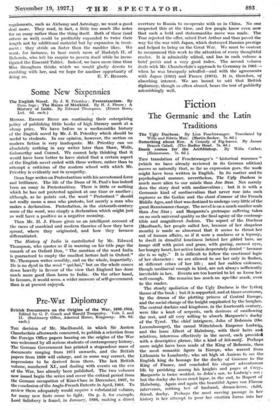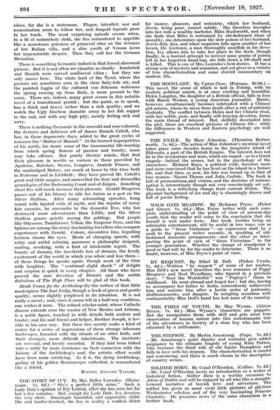Fiction
The Germanic and the Latin Traditions
The Ugly Duchess. By Lion Feuchtwanger. Translated by Willa and Edwin Muir. (Martin Becker. 7s. 6d.) Tats translation of Feuchtwanger's " historical romance " (which we have already reviewed in its German edition) moves so naturally that, so far as expression goes, the work might have been written in English. In its matter and its psychological manner, nevertheless, The Ugly Duchess is much more alien to our minds than Jew Suss. Not merely does the story deal with mediaevalism ; but it is with a Germanic kind of mediaevalism that never rose into such raptures as the Gothic and the chant d'anwur of the French Middle Ages, and that was destined to undergo very little of the great Renaissance change. The novel is on a much smaller scale than Jew Miss ; and Margarete's grotesque suffering takes on no such universal quality as the final agony of the contemp-
tible and magnificent Judean. The aspect of the Duchess (Maultasch, her people called her, because of her shapeless
mouth) is made so abnormal that it seems to thrust her out of human affairs, as if it were a madness or a leprosy, to dwell in dreadful loneliness behind her gilded bars, an image stiff with paint and gems, with gazing, earnest eyes,
her hungry heart, her active brain desperately denied " because she is so ugly." It is difficult to follow the emotional logic of her character : we are allowed to see her only in flashes, at different crises of her life ; and her sudden violences, though mediaeval enough in kind, are not always sufficiently inevitable in her. Events are too hurried to let us know her well enough. She remains too much an ape-like mask, even to the reader.
The steady spoliation of the Ugly Duchess is the lyrical
theme of the book ; but it is supported, and at times overcome, by the drama of the plotting princes of Central Europe, and the social change of the knight supplanted by the burgher. The central duchies and kingdoms, in the fourteenth century, were like a knot of serpents, each desirous of swallowing the rest, and all very willing to absorb Margarete's duchy of the Tyrol. The chief intriguers, John of Bohemia (the Luxembourger), the casual Wittelsbach Emperor Ludwig', and the lame Albert of Habsburg, with their heirs and relatives, intercross effectively in the novel, each provided with a descriptive phrase, like a kind of leit-motif. Perhaps more might have been made of the King of Bohemia, then the most romantic figure in Europe, who warred from Lithuania to Lombardy, who sat high at Amiens to see the English king do homage for the duchy of Guienne to the King of France, and concluded his elegant adventurous
life by perishing among his knights and pages at Crecy. Margarete is twice wedded, to John's son, to Ludwig's son ; but the duchy she loves must lapse, in the end, to Rupert of Habsburg. Again and again the beautiful Agnes von Flavon intervenes, robbing her of husband, dream-lover, child. friend, duchy. Perhaps the most moving passage in her history is her attempt to pour her creative forces into her
cities, for she is a statesman. Plague, interdict, war and assassination seem to follow her, and fungoid legends grow in her track. The most surprising episode occurs when, in a fit of melancholy sloth, she lies surrendered to appetite like a monstrous priestess of primeval rites on the terraces of her Italian villa, and a- slim yoUth of Verona loves her impenetrable despair. Then they call her the German Messalina.'
There is something Germanic indeed in that forced abnormal picture. But it is not often we Visualize so clearly. Innsbruck and Munich were carved medirieval cities ; but they are only names here. The white land of the Tyrol, where the gnomes are sometimes seen in the clear fairy-tale air, and the painted loggia of the cultured von Schenna' welcomes the spring coming up from Italy, is more present to the sense. There are, indeed, many great scenes in this notable novel of a transitional peridd ; but the paint, so to speak, has a thick and heavy rather than a rich quality, and we watch the Ugly Dpchess shamble away to her fish supper in the end, not with any high pity, merely feeling sick and - sorry.
There is nothing Germanic in the emerald and rose-coloured, the derisive and delicious art of James Branch Cabell, who has, in these degenerate days, added to the great cycles of romance the." Matter of Manuel." At the learned improprieties of his mirth, his ironic sense of the immemorial life-worship from which spring flowers of passion and beauty, some may take offence. But purely literary minds, that find their pleasure in worlds so various as those provided by Apuleius, Rabelais, Sterne, Congreve, Anatole France, and the unabridged Malory, are much at home by this time both in Poitesme and in Lichfield ; they have proved Mr. Cabell's great and little magies, and unravelled the fiery and dreamlike genealogies_of the Redeeming Count and'of Jurgen. Something about Eve will 'much increase- their pleasure. Gerald Musgrave passes out of his library to ride for Antan as a god on the Silver Stallion. After many astounding episodes, hung round with figured veils of myth, and the repulse of many fair enemies, he succumbs to the domestic Eve, who' has destroyed more adventurers than Lilith, and the Silver Stallion grazes quietly among the geldings. But people like Odysseus, Tannhauser, Villon, the Emperor Nero, and the Sphinx are among the many fascinating travellers who compare experiences with Gerald.- Colour, decorative line, beguiling horizon charm the eyes. Music of changing speech, with witty and artful refrains, murmurs a philosophy resigned, smiling, mocking, with a hint of intolerable regret. - The beauty of dreams, the inevitable loss of dreams, the lovely excitement of the world in which you adore and lose them— of these things he speaks again, though most of the time with laughter. The " continual slight shock " of delight and surprise is quick in every chapter. All those who have proved the rare devotion of Domnei and the subtle diabolism of The High Place will be glad of this book.
Death Comes for the Archbishop (by the author of that little masterpiece The Lost Lady), though a book of grave and gentle quality, seems slightly perplexed in its intention. It is not really a novel ; and; since it seems left in a half-way condition, one wishes it were. The refined scholar-saint, whose Catholic diocese extends over the wastes of New Mexico and Arizona, is a noble figure, touched in with details both austere and tender ; and his naif friend and helper, Brother Joseph, is lov- able in his own way. But these two merely make a kind of
centre for a series of impressions of these strange inhuman landscapes, kneaded with the rituals of an older faith, and their stranger, more difficult inhabitants. The incidents are unusual, and keenly recorded. If they had been linked into' a unity by more insistence on their connexion with the history of the ArChbishop's soul, the artistic effect would have been more satisfying. - As it is, the dying Archbishop, gazing at his golden Romanesque cathedral, is 'remembered like a frierid.
RACREL ANN AND TAYLOR.















































 Previous page
Previous page